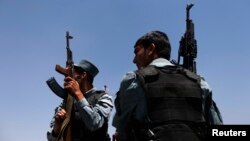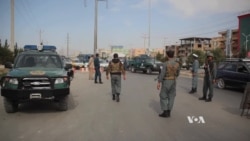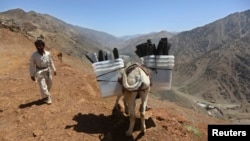KABUL —
Afghan voters are heading to the polls under the threat of Taliban attack to vote in a runoff presidential election.
The Taliban has vowed to violently thwart Saturday's election, and the mood across the country appeared to be wary as security forces made last-minute efforts to secure polling stations.
There were several explosions in the capital Saturday morning, but there have been no reports of casualties.
Afghan troops stepped up security sharply, erecting more checkpoints, searching cars and banning trucks from the streets of the capital, Kabul.
Presidential candidates Abdullah Abdullah and Ashraf Ghani have pledged to maintain a close military relationship with the United States. That would allow nearly 10,000 American troops to remain in the country for two more years to conduct counterterrorism operations and continue training and advising the Afghan army and police.
Both candidates served in the Cabinet of President Hamid Karzai, who has led the country since December 2001 after the Taliban government was toppled.
Show of force
In addition to regular troops, some 195,000 extra forces have been deployed to protect voters and the roughly 6,300 polling centers, says Ministry of Defense spokesman General Zahir Azimi.
“All the mountains, valleys and areas where the enemy could attack, your sons and your brothers, our soldiers, are putting their lives on the line to prevent any threats and to protect your presence at the polling stations,” he said.
The winner will have to contend with a weak economy, militant violence, and how to keep the international community involved in Afghanistan’s development.
Jan Kubis, the UN special envoy to Afghanistan, calls the vote crucial to the country’s future.
“Afghanistan is heading for one of the most important days in the modern history of this country,” he said.
Gauging national public support for either candidate is difficult, but surveys published in recent weeks indicate the race will be close.
Ghani supporters such as Maryam Suleiman Kheil are convinced their preferred candidate, a former World Bank official and finance minister, is best equipped to stabilize the country and lead it forward.
“He’s the person I feel is the most capable of bringing a change, a basic foundation for the future of Afghanistan, for the security of the world and for the youth,” she said.
Agendas, supporters
Abdullah backers such as Mahmoud Saikal, however, are just as adamant, saying only the former foreign minister can pull together a country riven by ethnic and tribal politics.
“We have been developing a national agenda for Afghanistan," he said. "We don’t have an ethnic agenda, we don’t have a linguistic agenda, we don’t have a regional agenda.”
Despite concerns about violence and fraud on election day, young voters in Kabul like Hodadad Shweib remain optimistic.
“Election is vital in a democratic practice in Afghanistan, so as a young person, as an Afghan, I am totally hopeful of the process and I am sure it will be much more successful,” said Shweib.
Officials are hoping Saturday’s turnout will strong, handing the country’s next leader a clear mandate.
The Taliban has vowed to violently thwart Saturday's election, and the mood across the country appeared to be wary as security forces made last-minute efforts to secure polling stations.
There were several explosions in the capital Saturday morning, but there have been no reports of casualties.
Afghan troops stepped up security sharply, erecting more checkpoints, searching cars and banning trucks from the streets of the capital, Kabul.
Presidential candidates Abdullah Abdullah and Ashraf Ghani have pledged to maintain a close military relationship with the United States. That would allow nearly 10,000 American troops to remain in the country for two more years to conduct counterterrorism operations and continue training and advising the Afghan army and police.
Both candidates served in the Cabinet of President Hamid Karzai, who has led the country since December 2001 after the Taliban government was toppled.
Show of force
In addition to regular troops, some 195,000 extra forces have been deployed to protect voters and the roughly 6,300 polling centers, says Ministry of Defense spokesman General Zahir Azimi.
“All the mountains, valleys and areas where the enemy could attack, your sons and your brothers, our soldiers, are putting their lives on the line to prevent any threats and to protect your presence at the polling stations,” he said.
The winner will have to contend with a weak economy, militant violence, and how to keep the international community involved in Afghanistan’s development.
Jan Kubis, the UN special envoy to Afghanistan, calls the vote crucial to the country’s future.
“Afghanistan is heading for one of the most important days in the modern history of this country,” he said.
Gauging national public support for either candidate is difficult, but surveys published in recent weeks indicate the race will be close.
Ghani supporters such as Maryam Suleiman Kheil are convinced their preferred candidate, a former World Bank official and finance minister, is best equipped to stabilize the country and lead it forward.
“He’s the person I feel is the most capable of bringing a change, a basic foundation for the future of Afghanistan, for the security of the world and for the youth,” she said.
Agendas, supporters
Abdullah backers such as Mahmoud Saikal, however, are just as adamant, saying only the former foreign minister can pull together a country riven by ethnic and tribal politics.
“We have been developing a national agenda for Afghanistan," he said. "We don’t have an ethnic agenda, we don’t have a linguistic agenda, we don’t have a regional agenda.”
Despite concerns about violence and fraud on election day, young voters in Kabul like Hodadad Shweib remain optimistic.
“Election is vital in a democratic practice in Afghanistan, so as a young person, as an Afghan, I am totally hopeful of the process and I am sure it will be much more successful,” said Shweib.
Officials are hoping Saturday’s turnout will strong, handing the country’s next leader a clear mandate.















